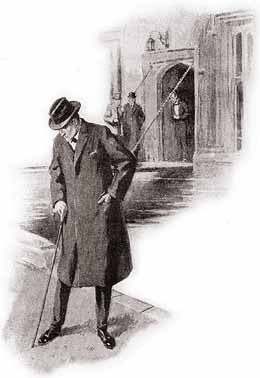| Darkness 4 | Darkness 5 |
We walked down the quaint village street with a row of pollarded elms on each side of it. Just beyond were two ancient stone pillars, weather-stained and lichen-blotched, bearing upon their summits a shapeless something which had once been the rampant lion of Capus of Birlstone. A short walk along the winding drive with such sward and oaks around it as one only sees in rural England, then a sudden turn, and the long, low Jacobean house of dingy, liver-coloured brick lay before us, with an old-fashioned garden of cut yews on each side of it. As we approached it, there was the wooden drawbridge and the beautiful broad moat as still and luminous as quicksilver in the cold, winter sunshine.
Three centuries had flowed past the old Manor House, centuries of births and of homecomings, of country dances and of the meetings of fox hunters. Strange that now in its old age this dark business should have cast its shadow upon the venerable walls! And yet those strange, peaked roofs and quaint, overhung gables were a fitting covering to grim and terrible intrigue. As I looked at the deep-set windows and the long sweep of the dull-coloured, water-lapped front, I felt that no more fitting scene could be set for such a tragedy.
“That’s the window,” said White Mason, “that one on the immediate right of the drawbridge. It’s open just as it was found last night.”
“It looks rather narrow for a man to pass.”
“Well, it wasn’t a fat man, anyhow. We don’t need your deductions, Mr. Holmes, to tell us that. But you or I could squeeze through all right.”
Holmes walked to the edge of the moat and looked across. Then he examined the stone ledge and the grass border beyond it.

“I’ve had a good look, Mr. Holmes,” said White Mason. “There is nothing there, no sign that anyone has landed – but why should he leave any sign?”
“Exactly. Why should he? Is the water always turbid?”
“Generally about this colour. The stream brings down the clay.”
“How deep is it?”
“About two feet at each side and three in the middle.”
“So we can put aside all idea of the man having been drowned in crossing.”
“No, a child could not be drowned in it.”
We walked across the drawbridge, and were admitted by a quaint, gnarled, dried-up person, who was the butler, Ames. The poor old fellow was white and quivering from the shock. The village sergeant, a tall, formal, melancholy man, still held his vigil in the room of Fate. The doctor had departed.
“Anything fresh, Sergeant Wilson?” asked White Mason.
“No, sir.”
“Then you can go home. You’ve had enough. We can send for you if we want you. The butler had better wait outside. Tell him to warn Mr. Cecil Barker, Mrs. Douglas, and the housekeeper that we may want a word with them presently. Now, gentlemen, perhaps you will allow me to give you the views I have formed first, and then you will be able to arrive at your own.”
He impressed me, this country specialist. He had a solid grip of fact and a cool, clear, common-sense brain, which should take him some way in his profession. Holmes listened to him intently, with no sign of that impatience which the official exponent too often produced.
| Darkness 4 | Darkness 5 |